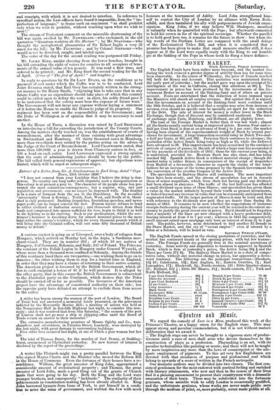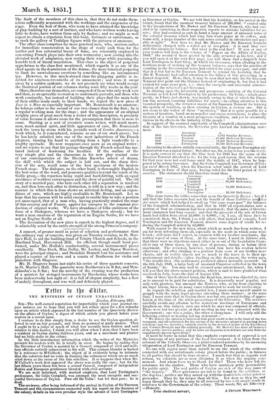thratrrg nal Fallffir.
We regard the comedy of Love in a Maze, produced this week at the Princess's Theatre, as a happy omen for the English stage. This may appear strong and peculiar commendation, but it is not without mature deliberation that we award it.
.7_ The English stage can never be brought to a vigorous state of produc- tiveness until a race of men shall arise who devote themselves to the construction of plays as a profession. Playmaking is an art, with its peculiar technicalities like painting or music; and these will not be taught by mere inspiration any more than the laws of counterpoint or the ade- quate employment of pigments. To this art very few Englishmen are devoted with that steadiness of purpose and professional zeal which belong to upwards of a score of writers in the French metropolis. Our dramatic authors may be divided into two classes. The first con- sists of gentlemen for the most endowed with poetical feeling and enriched with literary attainments, who now and then in the course of their lives find it a pleasing amusement to present their countrymen with a dramatic emanation of their brain. These may be subdivided into the fortunate geniuses, whose amiable wish to edify London is occasionally gratified, and the unfortunate geniuses, whose works are never made public save through the medium of print, or, more probably, never made public at all. The fault of the members of this class is, that they do not make them- selves sufficiently acquainted with the workings and the exigencies of the stage. Even the best of them, who seem to have attained the knowledge of play-building by a sort of instinct, and who have written works leaving little to desire, have written them only by flashes ; and we might as well expect to obtain a repertoire from this body, fortunate or unfortunate, as to stock the gallery of Trafalgar Square with the pictures of amateurs.
The other class comprises far more practical men, who, anxious rather for immediate remuneration in the shape of ready cash than for the tardier and less substantial boons of fame, are constantly employed in converting French plays into their own vernacular ; now soaring into the elevated work of adaptation, now resting their wings while pursuing the humble task of literal translation. This class is the object of perpetual opprobrium to the class first mentioned, which regards it as one of the chief agents in the degradation of the drama; the more fanatical proposing to limit its unwholesome exertions by something like an international tax. However, to this much-abused class the playgoing public is in- debted for nineteen-twentieths of its amusement ; and were it swept away by a sudden epidemic, we do not precisely see what would occupy the theatrical portion of our columns during some fifty weeks in the year.
Since, therefore our dramatists, are composed of those who only work now and then, as an agreeable recreation to undramatic pursuits, and those who work constantly, but instead of building their plays find the main body of their edifice ready made to their hands, we regard the new piece of _Love in a Maze as especially important. Mr. Bourcicault is no amateur ; he belongs rather to the second of our two classes than to the first ; he is a regular working man for the stage; and the appearance of an original weighty piece of great merit from a writer of this description, is precisely of value because it allows room for the presumption that there is more to come. Starting as a sort of eccentric comic writer, with much smart- ness, much animal spirit, and little appearance of care, Mr. Bourcicault took the town by storm with his juvenile work of London Assurance,—a work which, be it remembered, remains as one of our stock pieces; but he has lately subsided into one of the most industrious of the French adapters, turning his hand to anything from a light vaudeville to a lengthy spectacle. He now reappears once more as an original writer ; and we rejoice to say that his passage through the French school has ma- tured instead of deadening his faculties. If the outline of the very simple plot and the characters in his new play remind some of our contemporaries of the Sheridan Knowles school of drama, the skill with which the subject is laid out, and the sharp divi- sion of the acts, recall some of the best specimens of the modern French stage. The dialogue, on the other hand, is thoroughly English in the best sense of the word, and possesses qualities beyond the reach of the Gallic grasp,—the repartees being rapid and hard-hitting, with an equal avoidance of reckless extravagance and the show of painful toil. The old story of a married pair, who hate each other till a separation is resolved on, and then love each other to distraction, is told in a new way ; and the manner in which this is done shows an artistica' feeling, and an expen- diture of care, which are highly creditable to Mr. Bourcicault. Let us hope that his success will be solid enough to enable him to take a position yet unoccupied, that of a man who, having practically studied the stage of this country and of France, applies his energies to the constant pro- duction of original works. We have abundance of folks ambitious of the fame of a Shakspere, whereas we have a Shakspere already ; but we want a man emulous of the reputation of an Eugene Scribe, for we have not an Eugene Scribe at all.
The decoration of the new piece is superb in the highest degree, and it is admirably acted by the entire strength of the strong Princess's company.



























 Previous page
Previous page